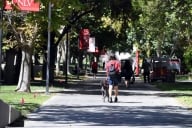You have /5 articles left.
Sign up for a free account or log in.
Many colleges have faced debates over building names or statues that honor heroes of the Confederacy or advocates for slavery.
The University of Pittsburgh has confronted a different kind of racism in its own history. And after extensive study, the university's chancellor, Patrick Gallagher, has announced that he is urging the Board of Trustees to change the name of the building that houses the public health program at Pitt.
That building is named for Thomas Parran Jr., a name that isn't as well-known as Robert E. Lee or John C. Calhoun. But to those in medicine and public health, including those who work in the building that has been named for him, Parran is associated with two of the science experiments that most stained the reputation of American medicine -- and that continue to have an impact today.
Parran was the first dean of Pitt's Graduate School of Public Health, serving from 1948 to 1958. He came to Pitt after he was U.S. surgeon general from 1936 to 1948. It was in that role that he oversaw two research projects that are today widely seen as violating the norms of informed consent. He oversaw the Tuskegee study that involved withholding vital information and treatment from black men with syphilis and was involved in similar research in Guatemala. These projects were deemed acceptable by those of Parran's generation of science leaders because the people being experimented on without their knowledge were not white.
Federal officials apologized -- years ago -- for the Tuskegee and Guatemala experiments. But the university did not move to consider a name change until graduate students petitioned for it. Some scientists have opposed efforts to drop names or honors from individuals who made contributions to medical science -- as Parran is seen as having done. But many at Pitt have been pushing for a change.
"While the federal government apologized to the Black community and Tuskegee survivors in 1997 and the American Sexually Transmitted Diseases Association renamed its Thomas Parran award in 2013, we still have Parran’s name on our building. While the federal government apologized for Guatemala in 2010, we still have his visage displayed in our building," said the petition.
"We must learn from the mistakes, prejudices, and grotesque acts of institutionalized racism and violence that characterize our history. However, it is imperative that we do not normalize and neutralize them by maintaining monuments to their architects. The name of a renowned public health school should not dedicate a position of reverence to someone who had a hand in such cruel and unethical research and medical conduct. Pitt should not give Dr. Parran reverence by retaining his name on the building," the petition added.
The university last year appointed a panel to consider the issues, and the chancellor accepted its recommendation for a name change.
That panel's report noted that Parran's exact role in Tuskegee and Guatemala is unclear. "However, because of his role as U.S. surgeon general during 1936-48, a tenure that overlapped the implementation of both studies, the committee felt that Dr. Parran bears some responsibility for the studies and their consequences, regardless of the exact level of his involvement." Further, the report noted that "the harm that resulted from these studies continues today" in the "legacy of mistrust by many African-Americans for their health care providers and a lower level of participation in the medical research studies, to the detriment of African-American health."
In his statement announcing his plan to rename the buildings, Gallagher noted that the board first honored Parran in 1969, before much of the information about both sets of studies was public.
"Both studies conducted human trials on vulnerable populations without informed consent," Gallagher wrote. "These actions are fundamentally at odds with the university’s core values. As the extent of Dr. Parran’s role in these studies has come to light after the board’s decision to name the property after him in 1969, it is appropriate to revoke this naming decision and to remove any perception of celebrating a name associated with these unfortunate human trials."








